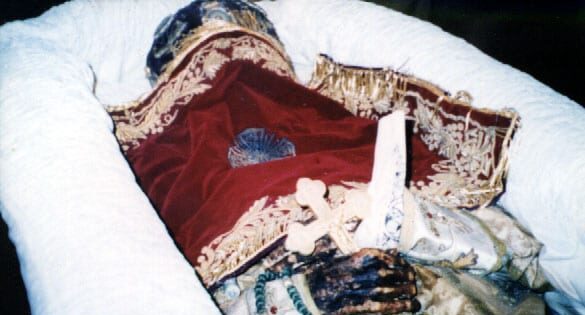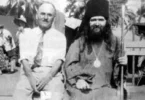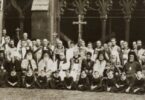For some years, eighty-two-year-old Metropolitan Philaret had been suffering from cancer of the prostate, although he had not been seriously incapacitated, and it was believed that he would live many more years. However, 1985 was a year of shocks to his sensitive mind and soul, as ugly rumors began to reach his ear concerning both Fr. Panteleimon of the Holy Transfiguration Monastery in Boston, and Archimandrite Antonii Grabbe, the son of Bishop Gregorii and head of the important and prestigious Ecclesiastical Mission in Jerusalem.
The Metropolitan, his years and health problems heavy upon him, still possessed a gentle purity of heart that did not quickly see evil in churchmen, and refused to listen to gossip and rumors. In addition, he had become less visible (except during divine services) and less accessible to those outside his own small, protective circle. He lived, now, primarily in the depths of his own soul and intellect, but this meant that certain kinds of problems went unnoticed and uncorrected.
Philaret respected Fr. Panteleimon and was personally fond of Archimandrite Antonii. When the charge of immorality against the Abbot of Holy Transfiguration Monastery was brought to his attention, the Metropolitan was both troubled and disbelieving. He referred the matter to Bishop Gregorii who, after an unofficial and cursory investigation, decided that the accusation was without foundation. Yet the rumors would not go away.
The case of Archimandrite Antonii was equally serious. For more than a decade, there had been rumors of financial mismanagement of Church monies and other irregularities in Jerusalem. Late in 1985, evidence was formally presented to the Synod of Bishops. Eyewitnesses reported that after the evidence was revealed, Metropolitan Philaret was in a state of deep distress, precipitating a rapid decline in his health.
On November 11, the Metropolitan summoned Bishop Gregorii to his room so Gregorii could hear his confession and give him Holy Communion. For the ensuing days, Philaret was bedridden, growing weaker and in pain, although alert and able to follow the monastic Prayer Rule read aloud by his attendant. The end came quietly in his sleep, in the presence of the Kursk Mother of God Icon, shortly before dawn on November 21, 1985.
The resident clergy immediately vested his thin body and placed him in a coffin, which was then carried to the cathedral to lie in state. That evening, three bishops, thirty priests, and more than a hundred faithful from the greater New York area gathered for the first memorial service. Using hymns set to music composed by the Metropolitan himself, the funeral on Sunday was concelebrated by six hierarchs (with two unwell bishops in attendance), nearly fifty priests, and more than a dozen deacons. That evening, a long cortege bore the prelate’s body to Holy Trinity Monastery in upstate New York, where a second requiem was held the next morning.
“At the conclusion… the clergy again shouldered the coffin and bore it around the church, and then to the Church of the Dormition in the cemetery… [where] the coffin was placed in a niche in the crypt under the church. A group of those who honor the late Metropolitan [announced plans] to erect a fitting chapel near the Holy Trinity Cathedral, where the remains of the First Hierarch will ultimately be interred.” [1] Translated from Pravoslavnaya Rus’, in Orthodox Russia, (November 28, 1985). Articles concerning the Metropolitan’s life and death appeared in newspapers throughout the country — most notably the New York Times — and on both television and radio news.
Events then moved quickly. Fr. Panteleimon and his disciples openly championed Archbishop Vitalii (Ustinov) of Montreal and Canada for the office of first hierarch. However, from the Russian point of view, this represented a distasteful intrusion of politics into the realm of the holy, for Panteleimon believed that Vitalii’s staunch anti-ecumenical views would insure him a strong voice in future Synod affairs. Everyone else, on the other hand, was simply hoping and praying for a metropolitan who would be personally warm and outgoing, and who would help bolster the sagging morale of the Church Abroad. Archbishop Antonii (Medvedev) of Western American and San Francisco (born in 1908 in Lithuania) was often spoken of in this context.
That fall the bishops postponed the election until the Feast of St. Philip (Metropolitan of Moscow) in late January, and Archbishop Vitalii functioned as locum tenens of the metropolitan throne. This gave the Panteleimonites nearly three months in which to shore up their position — in urgent need of repair because their outspoken extremism had alienated so many, and because the rumors about Fr. Panteleimon were circulating more insistently than before.
On January 22, 1986, sixteen bishops met before the Kursk Icon at the Cathedral in New York and “unanimously resolved to leave the matter [of a new first hierarch] to the will of God, to choose a Metropolitan by a lot.” [2] Orthodox Life, (January/February 1986). Following a requiem for the first three metropolitans of the Church Abroad, and then a service of intercession before the Kursk Icon, two candidates, Vitalii of Montreal and Canada (born in St. Petersburg in 1910) and Antonii of Geneva and Western Europe (also born in St. Petersburg, in 1911) were nominated by ballot. A pious old monk was brought forth to draw the lot between the two. The name chosen was that of Archbishop Vitalii, and the following weekend he was enthroned according to the ancient Muscovite ceremony used for Metropolitan Philaret.
Vitalii, the fourth metropolitan of the Church Outside Russia, had lived with his family in France after the Russian Revolution, entering monastic life in Czechoslovakia in 1939. Following World War II, he served as a pastor in one of the German camps for displaced persons, and in 1948 he was transferred to London. In 1951 he was consecrated bishop for Brazil, and in 1954 he was assigned to Canada, where he became known both for his work with young people and his extensive publishing activities. In the 1960s and 1970s, Vitalii had been instrumental in enlightening his brother bishops on the subject of ecumenism.
As soon as Metropolitan Vitalii was enthroned, Abbot Panteleimon moved swiftly to annul his earlier suggestions that the Church Abroad was perhaps not firm enough concerning ecumenism. He chose the forum of a long open letter to a non-Greek priest in which the repeated theme was his loyalty to the Church Abroad:
“The Synodal Church [the Russian Orthodox Church Abroad] is a real standard of Orthodoxy… Therefore, discerning where the Truth is found, we remain in unity under our bishops in the midst of many trials and temptations… because grace abides in the Synod… We uphold our Synod primarily and foremostly as a standard of Orthodoxy. All others have betrayed the Truth. This was demonstrated of late by the election of our new Metropolitan…” [3] Letter to the author, (February 10, 1986).
However, unknown to Panteleimon, the sobor which had chosen and installed the new Metropolitan had also extensively discussed the extremist views of the Panteleimonites — reflected by a new attack against the Serbian Church in Orthodox Christian Witness — and the charges of immorality. With regard to the first, the Synod wrote to the editor of Christian Witness, Fr. Neketas:
“The highly polemical and negative tone of many of the articles which you publish in your widely-circulated [publication] frequently evokes waves of agitation and misunderstanding among our faithful, especially among the neophytes in our Church. In this way, you scandalize the “little ones” and cause grief to the hierarchy which gave you shelter and placed you under its omophorion, which remains unchanged and unswerving in its faithfulness to a pure confession of the Holy Orthodox Faith.
Your present article on the Serbian Church is a case in point. You assigned to yourself the position of judge and arbiter of a difficult Church question without first consulting your local bishop on this matter… Thus, you sinned in publicizing your disagreement with Church policy without first asking for an explanation.
Our bishops cannot but maintain a feeling of gratitude and love for the Church of Serbia which, in difficult times, gave our Church shelter and protection… We trust that henceforth you will exercise extreme caution in what you print, avoiding zeal not according to reason, and that you will continuously seek the guidance and direction of your diocesan bishop…” [4] Letter from Bishop Hilarion to Fr. Neketas Palassis, (March 31, 1986).
No one could mistake the intention of the Synod: Fr. Panteleimon and his followers among the clergy and laity were to immediately cease misrepresenting the views of the Church Abroad.
At the same time, the hierarchs appointed a special commission of two bishops to visit the Boston monastery and begin a private investigation into charges of sexual perversion. The commission presented its report at a meeting of the Synod on May 29, 1986, receiving testimony in person from four monks who had left the Holy Transfiguration Monastery. Fr. Panteleimon was present and denied the charges, but asked to be relieved of his position as abbot. The bishops granted his request, placing the monastery temporarily under Archbishop Antonii (Sinkevich) of Los Angeles and Southern California. The monks at the monastery in Boston, however, ignored this and elected one of their own — another monk who had also been charged with immorality — as abbot.
For the next several months, information and testimony continued to be gathered, with no predetermination of Panteleimon’s guilt or innocence. Looking back, the bishops may well feel that they should have hastened this investigation for, during this period of time, an unprecedented explosion of protest erupted from the supporters of Fr. Panteleimon. The bishops were bombarded by hundreds of letters, petitions, phone calls, and personal visits — all of them protesting their “Elder’s” innocence and the unfair, even “un-American” way in which they believed his case was being handled.
Simultaneously, Fr. Panteleimon began to make public his own list of grievances, announcing that the bishops were, practically speaking, abandoning the Anathema against Ecumenism and beginning to compromise the Faith. Secret plans and negotiations, he charged, were being worked out with the Moscow Patriarchate so that the Church Abroad could unite with the Mother Church by 1988 (the millennium of the Baptism of Russia). According to Panteleimon, this meant that the hierarchs had become, or were in the process of becoming, heresiarchs, and that the faithful had better look to their souls! This was a complete reversal of his published views of only months before.
On November 25, 1986, Metropolitan Vitalii was asked by the Synod of Bishops to suspend Fr. Panteleimon and the abbot who had been uncanonically elected to succeed him, pending a canonical trial. This was done on December 3; nine days later, Vitalii received a letter announcing that the monastery in Boston had left the Russian Orthodox Church Outside of Russia and was taking refuge under an unnamed Greek Old Calendar bishop. Synod headquarters immediately declared this action to be
“…a flagrant violation of the holy canons of the Church and… an attempt to avoid the consequences of any final decision a spiritual court might have made concerning the accusations [of immorality]… [This is an attempt] to flee from the spiritual authority of the Church’s hierarchy.
The charges [made against our hierarchs] as a pretext for departure from the Synod — that the Bishops of the Russian Synod are now more inclined towards ecumenism and lack concern for the Greek parishes — are preposterous. Our bishops continue to confess the holy Orthodox Faith just as faithfully and just as unswervingly as they did when Archimandrite Panteleimon entered the jurisdiction of the Russian Synodal Church, seeking refuge from the innovations of the New Calendar churches. Our bishops have warned their flocks countless numbers of times concerning the spiritual danger of the ecumenical movement, of renovationism and modernism, and stand firmly against their encroachment into the life of our Church. They seek no rapprochement with the Soviet-dominated Moscow Patriarchate…” [5] “Statement from the Chancery of the Synod of Bishops,” (1986).
These words had no effect, and over the next two months, the schism gained momentum as Greek parish after parish chose to follow Fr. Panteleimon rather than remain with the Russian bishops. When all was said and done, a monastery and convent, and nearly a dozen parishes, together with their priests and deacons, had gone into schism.
Although there was genuine concern over the spiritual fate of the schismatics — and there was an invitation to them to return to the discipline of the Church (see Appendix VII for the bishops’ “Appeal” to the schismatics) — many felt a strong sense of relief, convinced that God had providentially purified the Church Abroad so that her attention and energies could be focused elsewhere. There was also a sober attempt to understand the roots of the schism and the extremism of its leaders. One evaluation, by a respected layman and convert, looked beneath Fr. Panteleimon’s evident desire to escape a spiritual court. Speaking first of the moderate stand of Metropolitan Vitalii and his Synod, this writer observed:
“The Greek Old Calendarists [to one splinter group of which Panteleimon had fled] have never shown a similar sense of moderation. The Greeks from antiquity have tended to be divided. Later, after the fall of Constantinople to the Latin Crusade in 1204, the Greeks lost the sense of wholeness [i.e. catholicity]… Having been distorted by isolation, they sadly developed a psychology of nearly Puritanical, pessimistic sectarianism, for their cultural, political, and religious context was forcibly kept in a static state by the Turks… In fighting the imposition of the Western Calendar [from the 1920s to the present], the truly Orthodox Greeks have [thus far] proved themselves unable to follow the example of our Russian Orthodox Church Outside of Russia in forging a jurisdiction of… transcontinental dimensions against the prevailing realities of revolution, communism, modernism, and ecumenism in our troubled times. These Greeks have been all too willing to break up over trivialities and mutual recriminations, at the drop of a hat ever ready to exchange ultimate accusations, creating bishoprics without ecclesiastical order or even common sense, and always ready to find heretics under the bed.
After many years of ridiculing and censuring the antics of their fellow Greek Old Calendarists, Fr. Panteleimon and his adherents have now followed their example.” [6] Extract from a report to Bishop Hilarion by Consenting Desrosiers, (February 18, 1987).
Shortly thereafter, the bishops defrocked Fr. Panteleimon.
As in the Panteleimon case, the firm leadership of Metropolitan Vitalii was also felt with regard to Archimandrite Antonii. For decades, the Grabbe family had been a potent force within the Church Outside Russia. Men and women of intelligence and talent, the Grabbes had energetically served the Church through many trials and tribulations and, particularly during the post-war years, had achieved several positions of importance and power, which included not only the leadership of the Department of External Affairs at Synod and the Ecclesiastical Mission in the Holy Land, but also the naming of a sister of Bishop Gregorii as abbess of the monastery for women in Lesna, France. All of this had earned the Grabbes the jealous enmity of some, and the respect of others.
The new Metropolitan, with the support of all the bishops except for Bishop Gregorii (Fr. Antonii’s father), now removed Fr. Antonii from his position as head of the Ecclesiastical Mission in Jerusalem, and suspended him from priestly functions pending the outcome of a spiritual court. But Fr. Antonii, who had observed carefully the strategy of Fr. Panteleimon, was quick to flee, finding a protector in the Old Calendar Greek Bishop Paisios (of “the True Hellenic Orthodox Church of North and South America”), who received him with honor in 1986. Simultaneously, Antonii, turning on the very Church his family had served, the Church which had in return nurtured and rewarded him, seized some of the Church Abroad’s property in the Holy Land and elsewhere, engaging the bishops in a long series of litigations that are still unresolved as of this writing. Bishop Gregorii, then in his mid-eighties, had been in delicate health for some time — doubtlessly aggravated by the controversy surrounding his son — and so he retired.
As the Russian Church Abroad prepared to enter 1988 — the important millennial year of celebrations for the Baptism of Russia — many of those who had guided the day-to-day activities of Synod headquarters for decades were gone, as was the extreme right-wing of the Church. Attention now focused on events in the Soviet Union — glasnost and perestroika — and their significance for the exiled branch of the Church.
References
| ↵1 | Translated from Pravoslavnaya Rus’, in Orthodox Russia, (November 28, 1985). |
|---|---|
| ↵2 | Orthodox Life, (January/February 1986). |
| ↵3 | Letter to the author, (February 10, 1986). |
| ↵4 | Letter from Bishop Hilarion to Fr. Neketas Palassis, (March 31, 1986). |
| ↵5 | “Statement from the Chancery of the Synod of Bishops,” (1986). |
| ↵6 | Extract from a report to Bishop Hilarion by Consenting Desrosiers, (February 18, 1987). |










